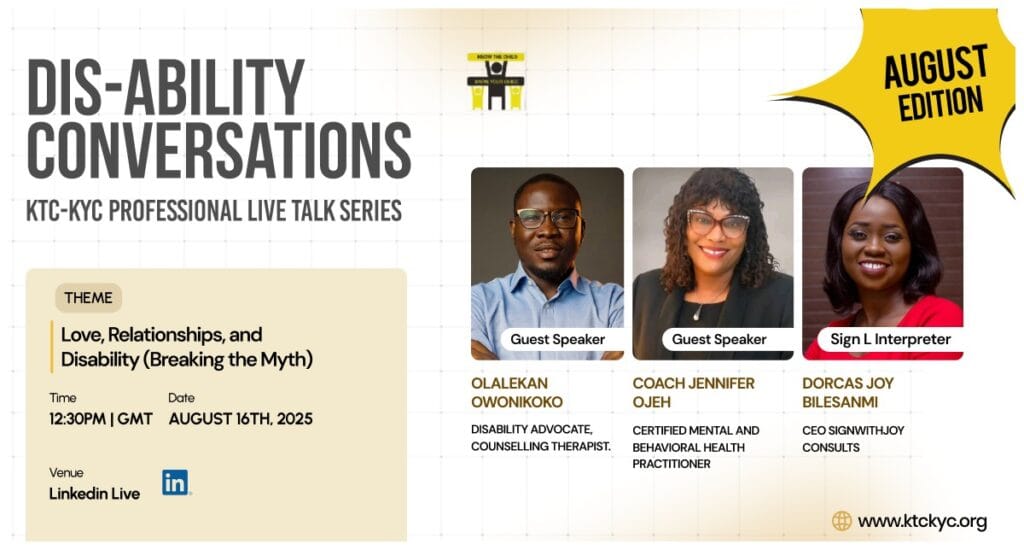Our August edition of Dis-Ability Conversations, like every other past one was an eye opener for everyone. With Mr. Lekan Owonikoko and Mrs. Jennifer Ojeh as our guest speakers, we explored a topic that is often overlooked or misunderstood: Love, Relationships, and Disability.
For many, disability is wrongly seen as a barrier to living fully. Yet, our speakers reminded us that persons with disabilities fall in love, get married, raise children, and build thriving families just like everyone else. What society often misplaces are the myths, barriers, and mindsets that need to be broken for true inclusion to happen.

Disability and Everyday Functioning
Disability does not erase humanity. Persons with disabilities experience the same emotions, struggles, and joys as anyone else. As Mr. Lekan explained, inclusion is about recognizing that disability does not deprive anyone of everyday functioning. Love, dating, marriage, and friendships exist in the disability community as naturally as they do anywhere else.
What makes the difference are the societal barriers that have been created over the years: The stigma, misconceptions, and lack of inclusive systems.
The Gaps in Support
One of the most pressing issues raised was the lack of inclusive emotional and therapeutic support. In Nigeria, therapy and counseling services are already limited, and even fewer are accessible to persons with disabilities.
“Imagine walking into therapy as a deaf or visually impaired person,” Mr. Lekan shared, “and the therapist has no idea how to communicate with you or what disability really means.
”Without accessibility, persons with disabilities are excluded from services that are supposed to help everyone heal and grow”.
Representation Matters
Stories matter. Representation matters. Society needs to see more examples of persons with disabilities in thriving marriages, raising families, and living with dignity. These examples challenge stereotypes and open doors for others to believe that love and happiness are possible — with or without disability.
The Role of Family
Families remain the strongest support system for many persons with disabilities. They provide financial support, emotional strength, and stability. But families also need guidance and the right tools to accommodate their loved ones; without overprotecting or limiting them.
Families can either be a bridge or a barrier. Their acceptance and advocacy are vital.
Mindsets and Disability
As Mrs. Jennifer powerfully put it, some disabilities are in the mindset. Society often assumes that persons with disabilities are helpless, incapable, or undeserving of choice. This is not true. Disability does not erase identity, dreams, or humanity.
Relationship struggles are universal. Disability does not exempt anyone from them, but it should also not deny anyone the right to experience love and partnership.
Policies and Inclusion
Inclusion cannot be an afterthought. Policies: whether health, education, or social must intentionally include persons with disabilities from the very beginning.
As Mr. Lekan emphasized, “Persons with disabilities must be in the room when policies are being drafted. They are the ones who can give real, direct feedback.”
Final Thoughts – Mrs. Jennifer
We closed the session with a powerful reminder from Mrs. Jennifer:
“Let’s go from here, not just with new knowledge, but with a new mindset. Breaking the myth is not just a conversation; it is a commitment. It shows up in our everyday lives when we choose to see people beyond their physical presentations, beyond their disabilities.”
Why This Conversation Matters
Love and relationships are part of the human experience, disability does not change that. What needs to change is society’s perception. Conversations like these help us humanize persons with disabilities, shift mindsets, and build a more inclusive society, one where everyone has the dignity to live, love and be loved.
We are deeply grateful to our speakers, Mr. Lekan and Mrs. Jennifer, for their professionalism, wisdom, and commitment to inclusion. And thank you to everyone who joined us for this edition of Dis-Ability Conversations.
Stay tuned for our next session!
